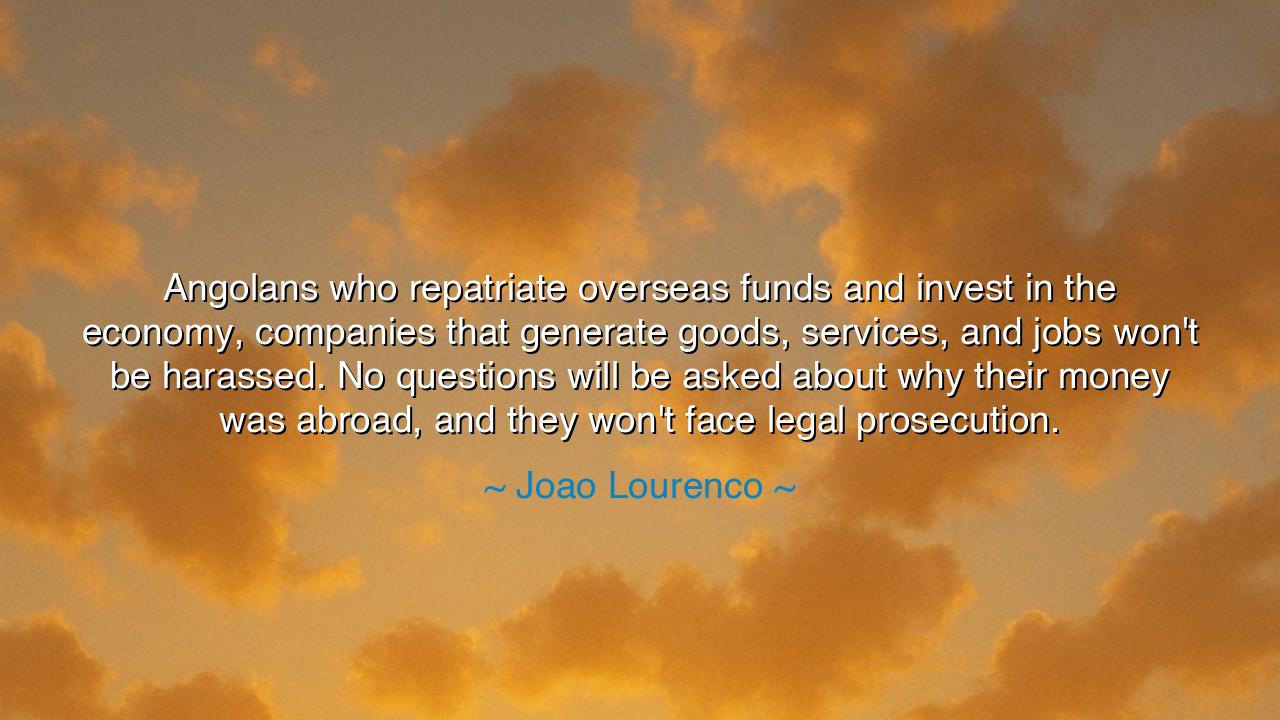
Angolans who repatriate overseas funds and invest in the economy
Angolans who repatriate overseas funds and invest in the economy, companies that generate goods, services, and jobs won't be harassed. No questions will be asked about why their money was abroad, and they won't face legal prosecution.






When João Lourenço, the President of Angola, declared, “Angolans who repatriate overseas funds and invest in the economy, companies that generate goods, services, and jobs won't be harassed. No questions will be asked about why their money was abroad, and they won't face legal prosecution,” he spoke as a ruler seeking both justice and renewal for his nation. His words were not only a decree of policy, but a call to conscience — an invitation to return home, not merely with wealth, but with faith restored. Beneath his statement lies the eternal struggle of nations that have suffered corruption, greed, and division: the struggle to heal through forgiveness and to rebuild through unity. His tone carries both firmness and grace, for it recognizes that sometimes, the road to redemption begins not with punishment, but with opportunity.
In the style of the ancients, Lourenço’s words resemble the proclamations of kings who sought to reconcile their people after times of ruin. His message is one of clemency guided by wisdom. He does not condone wrongdoing, yet he understands that retribution alone cannot rebuild what corruption has broken. The wealth that left Angola was not merely gold or capital — it was a part of the nation’s soul, scattered by fear, mistrust, and self-interest. By inviting these funds home without vengeance, Lourenço embodies the philosophy that true leadership must know when to wield the sword and when to sheath it. He speaks as a restorer — one who understands that sometimes mercy is a greater instrument of power than the law itself.
The origin of this quote lies in Angola’s history of vast oil wealth and decades of mismanagement under the shadow of war and corruption. When Lourenço came to power in 2017, he inherited a country burdened by inequality and economic decay, where billions of dollars had fled to foreign accounts. His offer was not a surrender to the corrupt, but a strategic act of national healing — a form of economic amnesty meant to draw wealth back into the hands of workers, builders, and dreamers. It was, in essence, a call to reconciliation between the nation and its exiled riches, a renewal of trust between government and people. The ancients would have seen in this gesture the wisdom of a leader who seeks to turn greed into growth and guilt into grace.
History offers echoes of such leadership. After the long wars of the Peloponnesian age, the Athenian statesman Thrasybulus offered amnesty to those who had sided with tyranny, proclaiming that the city could not survive on endless revenge. “Let no man remember the past to harm another,” he said — and by this act, he restored Athens to peace. Lourenço’s decree holds the same spirit: to rebuild not by punishing what was lost, but by summoning back what can still be saved. He does not excuse the sins of the past, but he looks beyond them — knowing that a tree cannot bear fruit if its roots remain poisoned by bitterness.
Lourenço’s words also carry a profound moral truth about forgiveness and responsibility. He tells his people: return what you have taken, invest in what you once abandoned, and you shall be welcomed as builders, not as exiles. This is not leniency for its own sake — it is a challenge to conscience. For to bring one’s wealth home is to admit one’s debt to the land that gave it birth. It is to recognize that patriotism is not a feeling, but a duty — the duty to restore balance, to give back to the nation that raised you. His promise of “no legal prosecution” is thus both mercy and mirror: it reveals the leader’s willingness to forgive, but also demands the citizen’s courage to return.
In a broader sense, Lourenço’s quote reflects the eternal law of renewal that governs both nations and souls: that destruction is easy, but rebuilding requires faith and humility. Many rulers throughout history have sought glory through conquest; few have found greatness through reconciliation. Yet those who did — from Lincoln healing America’s Civil War wounds to Mandela reconciling South Africa — understood what Lourenço understands: that progress begins when forgiveness is paired with responsibility. The act of repatriation becomes not only economic, but spiritual — a cleansing of the nation’s conscience, a return to moral order through action, not rhetoric.
The lesson of Lourenço’s words reaches beyond Angola’s borders. It teaches that mercy is not weakness, and that law must sometimes serve life, not merely punish death. Every leader, every citizen, every soul must at times confront their own estrangement — from country, from justice, from self — and decide whether pride is worth more than peace. Lourenço’s decree calls us to choose the harder, nobler path: to rebuild what was broken, to restore what was lost, and to trust again where trust once failed. For only through such acts of renewal can nations rise from decay to greatness.
So, let this teaching be remembered by those who govern and those who serve: wealth is meaningless without loyalty, and power is hollow without mercy. When the hand of law is guided by wisdom, and when the heart of a leader seeks not vengeance but restoration, then even the most fractured nation can be made whole again. Lourenço’s call to his people is a call to all humanity — to return home, not only with riches, but with righteousness.






AAdministratorAdministrator
Welcome, honored guests. Please leave a comment, we will respond soon